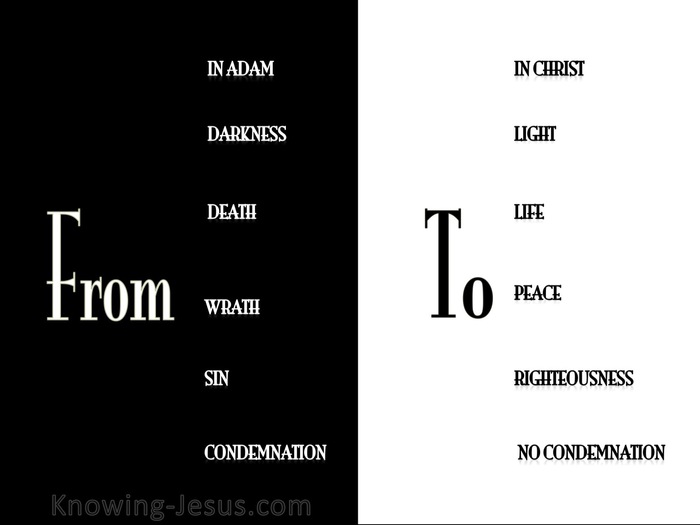28 Bible Verses about Salvation Not By Works
Most Relevant Verses
for by grace are ye saved, thro' faith (and that not from us: it is the gift of God) but not by works, so that no man can boast:
I do not frustrate the grace of God: for if justification be by the law, Christ died to no purpose.
God having sent his own son invested with a body like that of sinful men, as a sacrifice for sin, thereby destroyed its power; which the law could not effect, human nature being in such a corrupted state.
so that this is a matter not dependent on him that wills or runs, but on God, who shews mercy.
and if it be by favour, it is not upon the account of merit. for then mercy would not be mercy.
take notice, 'tis I Paul declare it to you, that if you are circumcised, Christ shall be of no advantage to you.
Christ is of no use to you, whoever of you seek to be justified by the law; you have lost all interest in the gospel-dispensation.
by him, every one who believes, is purged from all that guilt, for which the law of Moses had made no such provision.
for by the observation of the law no one shall be justified in his sight, since it is the law that takes cognizance of sin. but the divine justification certified by the law and the prophets, is now clearly proposed independently of the law: that divine justification, which by faith in Jesus Christ is extended to all, that believe; for there is no distinction:read more.
for all having sinned, all have forfeited eternal glory: being justified by his unmerited favour through the redemption that is by Jesus Christ: whom God had ordained, thro' faith, to be the propitiatory victim by his blood, for the manifestation of his goodness, by patiently passing over their past transgressions: to manifest, I say, his goodness at this time: that he might appear to be just, and the justifier of him who believes in Jesus. what reason then is there for boasting? it is excluded. what, by the ceremonial law? no: but by the law of faith. for we conclude, that a man is justified by faith, without observing the legal rites. is God the God of the Jews only, and not of the Gentiles? surely he is of the Gentiles too; since it is one God, who will justify both the Jews and the Gentiles, through faith.
How then can we assert, "that Abraham our father obtained this from circumcision?" for if Abraham was justified by works, he had matter of pretension, whereas he had no such claim from God. for what saith the scripture? "Abraham believed God, and it was counted to him for righteousness."read more.
the reward is not counted as a favour to him that has done good actions, but as a debt: whereas he that trusts in God to be made righteous, tho' he has not done such actions, shall find his faith accounted as righteousness. even as David also speaks of the happiness of the man whom God accounted righteous independently of his works, " happy are they whose iniquities are forgiven, and whose sins are covered.
but Israel, who followed the law of justice, hath not attained to the law of justice. why? because they sought it not by faith, but indeed by the works of the law: for they stumbled at that stumbling-stone;
For tho' I should speak with the eloquence of men, and of angels, and not have social affection, I should be like sounding brass, or a noisy cymbal. and tho' I should have the gift of prophecy, and understand all mysteries, and all knowledge; and tho' I had all the faith necessary to remove mountains, and had no benevolence, it would signify nothing. and tho' I distribute my whole substance to the poor, and give my body to be burned, and have not social affection, it profits me nothing.
yet knowing that a man is not justified by the works of the law, but by faith in Jesus Christ, even we have believed in Christ Jesus, that we might be justified by faith in him, and not by the works of the law, by which there is no justification.
but they that rest themselves upon the works of the law, are obnoxious to the curse: for it is written, " cursed is every one, who continueth not in all things, which are written in the book of the law, to do them:" but that no man is justified by the law in the sight of God, is evident: for, " the just shall live by faith." now the law does not justify by FAITH, but says, "he that DOES these things shall live by them."
Is the law then opposite to the promises? by no means. for if there had been a law given, which could have given life, certainly justification should have been by the law.
or rather that you are favoured by him, how can ye turn again to the weak and beggarly elements of the law, to which you desire again to be in bondage? observing as you do, the days, the moons, the feasts and years. you make me apprehensive, that the labour I have bestowed upon you will be all in vain.
for in the christian-dispensation, neither circumcision avails any thing, nor uncircumcision, but an active benevolent faith.
for in the dispensation of Jesus Christ, neither circumcision availeth any thing, nor uncircumcision, but the new creation.
for we are the genuine sons of Abraham, who worship God in the spiritual manner, and value no other dependance than that on Jesus Christ, without confiding in any external advantages: which I might do more justly than any other man can pretend to: being circumcised the eighth day, of the family of Israel, of the tribe of Benjamin, an Hebrew by descent, by sect a Pharisee.read more.
if zeal is to be regarded, I persecuted the church; if the integrity prescrib'd by the law, I am without reproach; these advantages I renounce for Christ, nay I think them disadvantages when put in competition with the excellency of the knowledge of Jesus Christ my Lord: for whose sake I abandon all these things, and count them as straw, that I may gain Christ, and be his true disciple, not professing that justification, which is derived from the law, but that which is from the gospel,
If then you are dead with Christ, in respect of those shadows of the Jewish state; why do ye, as if you were still in that state, submit to those ordinances? "don't eat this, don't taste that, nor touch it:" which yet were all made to be consumed for our use, notwithstanding the injunctions and doctrines of men:read more.
by which indeed they make a pretence to wisdom, by a worship of their own devising, by an air of humility, and self-denial, and a disregard to the gratifications of sense.
who has saved us, and by the gospel hath called us to holiness, not in consideration of our works, but in pursuance of his own resolution, and the favour, which having been promised us by Jesus Christ several ages ago,
but when the kindness and love of God our saviour display'd itself to mankind, he saved us not in consideration of any virtuous actions which we had done, but out of his meer mercy, by the baptism of regeneration, he form'd us anew, by the plentiful effusion of the holy spirit,
Whereas 'tis we who have believed that shall enter into rest, as he said, "wherefore I have sworn in my wrath, that they shall not enter into my rest." which is different from that rest, at the beginning of the world, when the work of creation was finished. of which in a certain place relating to the seventh day, 'tis said, "and God did rest the seventh day from all his works." but in this place 'tis said, "they shall not enter into my rest."read more.
Since there remains then a rest which some are still to enter into, for they to whom the promise was first made, did not enter in, because of their incredulity; he pointed out another time in the words, which were spoken by David, a long time after their going into Canaan, in the passage just now quoted, "today since ye hear his voice, harden not your hearts." for if Joshuah had given them rest, David would not afterwards have mentioned another day. which shows that the people of God have a sabbath still to come. then he that enters into divine rest, will indeed rest from his works, as God did from his.
Therefore omitting for the present the principles of the christian doctrine, we shall proceed to something more sublime, without mentioning those fundamental articles of repentance from destructive vices, and of divine faith: the doctrine of baptisms, and laying on of hands, the resurrection of the dead, and eternal judgment:
for he that violates but one precept of the whole law, is as obnoxious to punishment, as if he had broke thro' all the rest. he that said, "do not commit adultery," said too, "do not kill." though you should not commit adultery, yet if you kill, you are a transgressor of the law.
for by the observation of the law no one shall be justified in his sight, since it is the law that takes cognizance of sin.
Then he propos'd this parable, concerning those who had a great opinion of their own justice, and look'd with contempt upon others. two men went to the temple to pray; the one a Pharisee, the other a Publican. the Pharisee in a standing posture pray'd thus by himself, O God, I thank thee, that I am not as other men, a robber, a cheat, an adulterer, or like that Publican.read more.
I fast twice a week, and I pay the tythe of all I possess. but the Publican, who stood a good way lower, not daring to lift up even his eyes to heaven, only smote his breast, and said, O God, be merciful to me, who am a sinner. I tell you this man went home approv'd as just, and not the other. for whoever exalteth himself shall be humbled, and he that humbleth himself shall be exalted.
for I declare to you, that except your righteousness shall exceed that of the Scribes and Pharisees, ye shall not enter into the heavenly kingdom.
Bible Theasaurus
Related Topics
- Accepting Christ
- God's Grace
- Grace
- Grace Verse Law
- Grace, And Salvation
- Hindering God's Work
- Justification
- Justification Is Not By The Law
Never miss a post

























